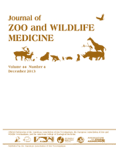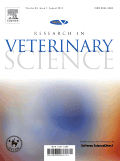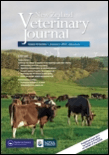
PESQUISA VETERINARIA BRASILEIRA
Scope & Guideline
Championing excellence in veterinary science since 1997.
Introduction
Aims and Scopes
- Veterinary Pathology and Diagnostics:
Research in this area includes studies on the pathology of various animal species, identification of diseases, and the development of diagnostic methods. This encompasses both infectious and non-infectious diseases, as illustrated by papers on histopathology and microbiology. - Clinical Veterinary Medicine:
The journal publishes a wide range of clinical studies that evaluate treatment protocols, clinical outcomes, and health management practices in domestic and wild animals. This includes investigations into various conditions affecting pets, livestock, and exotic animals. - Epidemiology and Zoonoses:
A significant focus is placed on the epidemiological studies of diseases that affect both animals and humans, particularly zoonotic infections. This includes research on the prevalence and control of diseases such as leptospirosis and tuberculosis in animal populations. - Toxicology and Pharmacology:
Research on toxicological effects of plants and chemicals on animals, as well as pharmacological studies to assess treatment efficacy, are prominent. This includes investigations into poisoning incidents and the therapeutic applications of various substances. - Animal Nutrition and Husbandry:
The journal includes studies on the nutritional requirements and feeding practices of various species, emphasizing the impact of diet on health and productivity in livestock and companion animals. - Wildlife and Conservation Medicine:
Research addressing veterinary care and disease management in wild species is also included, highlighting the intersection of veterinary science and conservation.
Trending and Emerging
- Molecular and Genomic Studies:
There is an increasing focus on molecular diagnostics and genomic characterizations, reflecting a trend towards precision medicine in veterinary practice, particularly in infectious disease management. - One Health Approach:
Research that integrates human, animal, and environmental health is gaining prominence, highlighting the interconnectedness of health issues across species and ecosystems. - Non-invasive Diagnostic Techniques:
Emerging technologies such as imaging and biomarker studies are becoming more common, providing veterinarians with new tools for diagnosis and treatment monitoring. - Antimicrobial Resistance Studies:
As concerns about antibiotic resistance grow, research addressing antimicrobial resistance patterns in various animal populations is trending, emphasizing the need for responsible medication use. - Veterinary Public Health:
There is an increasing emphasis on public health aspects of veterinary science, particularly in relation to zoonotic diseases and their management, which underscores the role of veterinarians in safeguarding public health.
Declining or Waning
- Traditional Breeding Practices:
Research related to conventional breeding methods and genetic studies in livestock appears to be declining, likely due to increasing interest in modern genetic techniques and biotechnology. - Veterinary Education and Training:
There has been a noticeable decrease in studies focusing on veterinary education methodologies and training programs, possibly overshadowed by more pressing clinical and research needs. - Livestock Disease Control Strategies:
Papers specifically focused on traditional disease control strategies in livestock are becoming less frequent, as newer, more innovative approaches to disease management gain traction.
Similar Journals

Ankara Universitesi Veteriner Fakultesi Dergisi
Pioneering research in veterinary sciences and animal biology.Ankara Universitesi Veteriner Fakultesi Dergisi is a prominent academic journal published by ANKARA UNIV, focusing on advancements in veterinary sciences and animal biology. Since its inception, the journal has been committed to disseminating high-quality research, featuring articles that span a variety of topics within veterinary medicine and animal science. With an ISSN of 1300-0861 and an E-ISSN of 1308-2817, this journal provides valuable insights into the latest research developments and trends, making it a critical resource for researchers, professionals, and students in the field. The journal has established itself within the scholarly community, achieving a Q3 rank in Animal Science and Zoology and a Q2 rank in Veterinary (miscellaneous) as of 2023, reflecting its growing relevance and impact. Positioned in Turkey, it serves as a vital platform for both local and international scholars to share innovative findings and foster collaboration. Enhancing its accessibility, the journal's content is available through various academic databases, ensuring that its readership can effortlessly access and engage with cutting-edge research.

Revista de Investigaciones Veterinarias del Peru
Fostering Knowledge, Enhancing Animal WelfareRevista de Investigaciones Veterinarias del Peru, published by UNIV NACIONAL MAYOR SAN MARCOS, stands as a pivotal resource within the field of veterinary sciences. With its ISSN 1682-3419 and E-ISSN 1609-9117, this journal aims to publish innovative research contributing to the advancement of veterinary practices and animal health. Since its inception in 1999, it has fostered an academic platform for professionals and researchers alike to share findings that are crucial for understanding and improving animal welfare in Peru and beyond. Although currently positioned in the Q3 category of Veterinary (miscellaneous) and ranked #163 out of 194 in the Scopus database, the journal's commitment to quality research and open access to veterinary knowledge continues to attract submissions and readership from a diverse audience. As it moves forward into 2024, the Revista de Investigaciones Veterinarias del Peru remains dedicated to disseminating critical insights that promote evidence-based practices in the veterinary field, stimulating further research and collaboration across continents.

AMERICAN JOURNAL OF VETERINARY RESEARCH
Elevating Animal Welfare Through Scholarly ContributionsAmerican Journal of Veterinary Research, published by the American Veterinary Medical Association, serves as a cornerstone of the veterinary medical community, providing essential insights from 1945 to the present. With an ISSN of 0002-9645 and E-ISSN of 1943-5681, this esteemed journal focuses on a diverse range of topics within the veterinary field, contributing to the advancement of veterinary science through rigorous peer-reviewed research. Ranking in the Q2 category in Veterinary (miscellaneous) and Q3 in Medicine (miscellaneous) category as of 2023, it holds a respectable position in Scopus rankings, further emphasizing its impact in the field. While currently not an Open Access journal, its objective remains clear: to disseminate cutting-edge research that informs clinical practice and enhances animal health and welfare. The American Journal of Veterinary Research is invaluable for researchers, professionals, and students seeking to stay at the forefront of veterinary advancements and innovations.

JOURNAL OF ZOO AND WILDLIFE MEDICINE
Championing the health of wildlife and zoo species.JOURNAL OF ZOO AND WILDLIFE MEDICINE, published by the American Association of Zoo Veterinarians, serves as a pivotal resource in the field of veterinary science, focusing specifically on the health and well-being of zoo and wildlife species. With an ISSN of 1042-7260 and an E-ISSN of 1937-2825, this journal is recognized for its significant contributions to animal science and has been categorized in the second quartile in both Animal Science and Zoology, as well as Veterinary disciplines, according to the latest rankings. It holds a respectable position within Scopus, being ranked #91 in General Veterinary and #290 in Animal Science and Zoology. While the journal operates on a subscription basis, its impactful research articles have been invaluable for clinicians, researchers, and students alike, providing crucial insights that advance wildlife conservation, veterinary practices, and animal health care from 1993 to the present. With a global reach and a targeted focus on both theoretical and practical applications, JOURNAL OF ZOO AND WILDLIFE MEDICINE is instrumental in fostering collaboration among professionals dedicated to the study and care of wild animal populations.

BERLINER UND MUNCHENER TIERARZTLICHE WOCHENSCHRIFT
Essential Reading for Veterinary ProfessionalsBERLINER UND MUNCHENER TIERARZTLICHE WOCHENSCHRIFT is an esteemed journal in the fields of Veterinary Science and Medicine, published by SCHLUETERSCHE VERLAGSGESELLSCHAFT MBH & CO KG. Since its inception in 1946, this journal has served as a vital platform for advancing knowledge and research in veterinary medicine within Germany and beyond. With a current impact factor that places it in the Q4 category in both Medicine and Veterinary, it continues to provide significant insights for professionals, researchers, and students engaged in the veterinary community. Although it is not an Open Access journal, its rich content contributes to the foundational literature of the field, making it an essential reference. Researchers looking to publish their findings or keep informed on the latest advancements in veterinary and medical practices will find this journal an invaluable resource. It is headquartered in Hannover, Germany, and serves as a testament to the ongoing dedication to veterinary research since the mid-20th century.

RESEARCH IN VETERINARY SCIENCE
Transforming Animal Care Through Groundbreaking StudiesRESEARCH IN VETERINARY SCIENCE, published by Elsevier Science Ltd, stands as an authoritative platform in the field of veterinary studies. With its origins dating back to 1965, this prestigious journal is recognized for its contribution to the advancement of veterinary knowledge and practices, boasting a remarkable Q1 categorization in Veterinary (miscellaneous) and ranking 24th out of 194 in the Scopus veterinary general category, placing it in the top 13% of its field. The journal presents a diverse range of research articles that explore critical topics in veterinary science, thereby facilitating evidence-based practices and innovations. Although currently not an open-access journal, it remains highly accessible through institutional and personal subscriptions, allowing researchers, professionals, and students to benefit from its rich collection of studies. As it moves toward 2024, RESEARCH IN VETERINARY SCIENCE continues to be a vital resource for those dedicated to improving animal health and advancing veterinary science.

ACTA VETERINARIA SCANDINAVICA
Advancing veterinary science through open access.ACTA VETERINARIA SCANDINAVICA is a prestigious open-access journal dedicated to advancing the field of veterinary science and promoting interdisciplinary research. Published by BMC since 2001, this journal has become a vital resource for veterinarians, researchers, and students worldwide, with an ISSN of 0044-605X and an E-ISSN of 1751-0147. With a remarkable impact factor reflecting its relevance—ranking in the Q2 quartile for Veterinary (miscellaneous) and Q3 for Medicine (miscellaneous)—ACTA VETERINARIA SCANDINAVICA focuses on a broad spectrum of veterinary topics, ensuring that critical research is available to the academic community and beyond. Located in the United Kingdom, this journal has successfully converged its publishing efforts from 1960 to 2024, highlighting its long-standing commitment to veterinary excellence. Researchers are encouraged to submit their work through the journal’s user-friendly platform, contributing to the ever-evolving landscape of animal health and welfare.

NEW ZEALAND VETERINARY JOURNAL
Elevating veterinary science with impactful insights.NEW ZEALAND VETERINARY JOURNAL, published by Taylor & Francis Ltd, stands as a pivotal platform in the realm of veterinary science, contributing significantly to the global discourse on animal health and welfare since its inception in 1952. With an ISSN of 0048-0169 and an E-ISSN of 1176-0710, this journal offers invaluable insights within both the veterinary and general medical fields, currently achieving a commendable Q2 ranking in Veterinary (miscellaneous) and Q3 in Medicine (miscellaneous) for 2023. Its Scopus ranking places it in the 76th percentile among veterinary journals, affirming its high-impact presence in academia. While access to this journal is not open, it maintains an essential role for researchers, professionals, and students aiming to advance their knowledge and contribute to the field of veterinary science. With a commitment to disseminating quality research, NEW ZEALAND VETERINARY JOURNAL enriches the understanding of veterinary practices and enhances ongoing dialogue on critical health issues affecting animals, promoting better outcomes through scientific inquiry.

BMC Veterinary Research
Transforming veterinary practices with cutting-edge research.BMC Veterinary Research, published by BMC in the United Kingdom, stands as a pivotal open-access platform dedicated to advancing the field of veterinary science since its inception in 2005. With an impressive impact factor that reflects its influential presence, this journal has achieved a remarkable ranking of #17 out of 194 in the Scopus Veterinary category, placing it in the 91st percentile among its peers. The journal serves as an essential resource for researchers, professionals, and students alike, fostering the dissemination of high-quality research and innovative practices within the veterinary and broader medical communities. With its commitment to open access, BMC Veterinary Research ensures that valuable insights are accessible to all, promoting collaboration and knowledge sharing that drive the advancement of veterinary sciences. As it continues to publish significant findings until 2024, it remains a key contributor to the contemporary discourse on animal health and welfare.

Thai Journal of Veterinary Medicine
Empowering practitioners with cutting-edge veterinary insights.Thai Journal of Veterinary Medicine, published by Chulalongkorn University, serves as a vital resource for researchers, practitioners, and students in the field of veterinary science. With an ISSN of 0125-6491, the journal has been providing a platform for the dissemination of original research and reviews since its inception, with a focus on advancing veterinary practice and animal health in Thailand and the broader Southeast Asian region. The journal is recognized in the Scopus database, currently ranked in the Q4 category for Veterinary (miscellaneous), reflecting its commitment to quality despite being in a highly competitive space. The scope of the journal encompasses a wide array of topics pertinent to veterinary medicine, ensuring accessibility to diverse veterinary disciplines. While the journal currently does not offer an open-access option, it remains dedicated to contributing valuable knowledge and insights to the veterinary community, supporting the improvement of animal welfare and public health initiatives in the region. As it continues to publish until 2024, the Thai Journal of Veterinary Medicine invites contributions that align with its objectives of fostering scholarly discourse and advancing veterinary research.